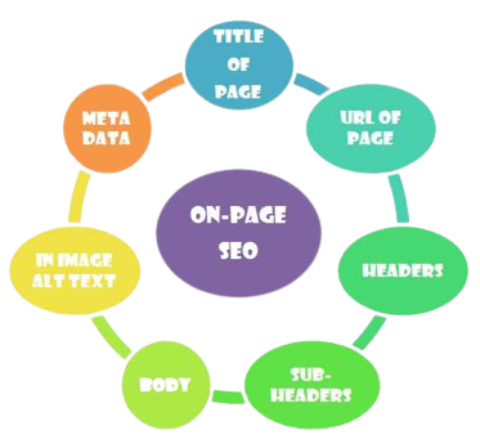Are you planning to hire an SEO agency? You are at the right place. SEO agencies offer a range of services aimed at improving a website’s visibility in search engine results pages (SERPs). These services are designed to help businesses and website owners increase their online presence, attract more organic traffic, and ultimately grow their online business.
Here are some common services provided by SEO agencies:
- Keyword Research: SEO agencies conduct extensive keyword research to identify relevant and high-traffic keywords that can be targeted to improve a website’s rankings. This involves analyzing search volume, competition, and user intent.
- On-Page Optimization: This involves optimizing various elements on a website to make it more search engine-friendly. This includes optimizing meta titles, meta descriptions, and header tags, and ensuring proper keyword placement throughout the content. Know more about Onpage SEO Services.
- Content Creation: High-quality, engaging, and informative content is crucial for SEO success. SEO agencies often provide content creation services, including blog posts, articles, infographics, videos, and other content types optimized for both users and search engines.
- Link Building: Building high-quality backlinks from authoritative websites is an essential part of SEO. Agencies work on acquiring backlinks through various methods, including outreach, guest posting, and content marketing. Know more about our offpage SEO services.
- Technical SEO: Technical SEO involves optimizing the website’s technical aspects to improve its performance in search engines. This includes improving site speed, and mobile-friendliness, fixing crawl errors, and implementing schema markup.
- Local SEO: For businesses with physical locations, local SEO services are essential. These services aim to improve a website’s visibility in local search results, including Google Maps and local directories.
- SEO Audits: SEO agencies often conduct comprehensive website audits to identify issues and opportunities for improvement. They provide recommendations and action plans based on the audit findings.
- Competitor Analysis: Analyzing competitors’ SEO strategies helps identify gaps and opportunities. SEO agencies research competitors to develop strategies that can outperform them.
- Analytics and Reporting: SEO agencies provide regular reports and analytics to track the progress of SEO campaigns. They use tools like Google Analytics and SEO-specific software to monitor keyword rankings, traffic, and conversions.
- Conversion Rate Optimization (CRO): While SEO is about driving traffic, CRO focuses on improving the website’s ability to convert that traffic into leads or customers. Some SEO agencies offer CRO services to enhance user experience and increase conversion rates.
- E-commerce SEO: For online retailers, SEO agencies specialize in optimizing product listings, improving site structure, and enhancing the overall e-commerce experience to drive more sales.
- Penalty Recovery: If a website has been penalized by search engines due to violating their guidelines, SEO agencies can help with penalty assessment and recovery efforts.
- Social Media Optimization: While not strictly SEO, some agencies offer services to optimize a business’s social media profiles and content to improve online visibility and engagement.
- SEO Training and Consultation: Some agencies offer training sessions or consulting services to educate businesses on SEO best practices and help them implement SEO strategies in-house.
The specific services offered by an SEO agency may vary depending on their expertise and the needs of their clients. It’s important to choose an agency that aligns with your goals and objectives to achieve the best results for your website’s SEO efforts.
Let’s understand all the services Offered by an SEO Agency one by one.
Keyword Research in SEO

Keyword research is a critical component of search engine optimization (SEO) and content marketing. It involves the process of identifying and analyzing the specific words and phrases (keywords) that people use when searching for information, products, or services on search engines like Google, Bing, or Yahoo. The primary goal of keyword research is to understand user intent, discover relevant keywords, and strategically incorporate them into your website’s content to improve search engine rankings and attract targeted organic traffic.
Here are the key steps involved in keyword research:
- Understanding Your Audience: The first step is to gain a deep understanding of your target audience. Who are your potential customers or readers? What are their needs, interests, and pain points? This understanding will help you create content that resonates with your audience.
- Brainstorming: Begin by brainstorming a list of potential keywords related to your business, industry, products, or services. Think about the terms people might use when searching for information in your niche.
- Competitor Analysis: Analyze your competitors’ websites to identify the keywords they are targeting. This can provide valuable insights into which keywords are relevant and competitive in your industry.
- Keyword Research Tools: Utilize keyword research tools to expand your list of potential keywords and gather data on their search volume, competition, and relevance. Some popular keyword research tools include Google Keyword Planner, SEMrush, Ahrefs, Moz Keyword Explorer, and Ubersuggest.
- Keyword Metrics: Pay attention to key metrics for each keyword, including:
- Search Volume: The average number of monthly searches for a particular keyword.
- Keyword Difficulty: An estimate of how challenging it is to rank for a keyword, often on a scale from 1 to 100.
- Click-Through Rate (CTR): The percentage of users who click on a search result after typing in a specific keyword.
- Cost Per Click (CPC): The average cost of a paid advertisement for a keyword in pay-per-click (PPC) advertising campaigns.
- Long-Tail Keywords: Consider targeting long-tail keywords, which are longer and more specific keyword phrases. While they may have lower search volumes, they often have less competition and can attract highly targeted traffic.
- Keyword Intent: Categorize keywords based on their intent:
- Informational Keywords: Used by users seeking information or answers to questions.
- Navigational Keywords: Used to find specific websites or brands.
- Transactional Keywords: Indicate a user’s intention to make a purchase or take a specific action.
- Content Strategy: Once you have a list of relevant keywords, develop a content strategy that incorporates these keywords naturally into your website’s content, including blog posts, product descriptions, landing pages, and more.
- Monitoring and Optimization: Regularly monitor the performance of your targeted keywords using analytics tools. Adjust your content and SEO strategies as needed to improve rankings and organic traffic.
Keyword research is an ongoing process because search trends and user behavior can change over time. By continually researching and optimizing your keyword strategy, you can improve your website’s visibility in search engine results and better meet the needs of your target audience.
OnPage SEO Services

On-Page SEO, also known as on-site SEO, refers to the optimization of various elements and aspects directly within a web page or website to improve its search engine visibility and rankings. These optimizations are made with the goal of making the page more relevant, user-friendly, and comprehensible to both search engines and human users. On-Page SEO techniques focus on optimizing content, HTML source code, and other on-page factors to enhance a webpage’s performance in search engine results pages (SERPs).
Key components of On-Page SEO include:
- Keyword Optimization: Incorporating relevant keywords naturally into various parts of a webpage, such as the title tag, meta description, headers (H1, H2, H3 tags), and throughout the content. Keyword optimization helps search engines understand the topic and relevance of the page.
- High-Quality Content: Creating informative, engaging, and valuable content that addresses the needs and questions of users. Well-written content not only attracts visitors but also encourages them to stay on the page longer, reducing bounce rates.
- Meta Tags: Optimizing meta tags, including the title tag and meta description. The title tag should be compelling and include the primary keyword. The meta description should provide a concise summary of the page’s content.
- Header Tags: Using header tags (H1, H2, H3, etc.) to structure content and make it more readable. The H1 tag is typically used for the main page title, while H2 and H3 tags are used for subheadings and sections.
- URL Structure: Creating clean and descriptive URLs that include relevant keywords and make it easy for both users and search engines to understand the content of the page.
- Image Optimization: Optimizing images by using descriptive alt text and compressing images to improve page load speed. Image alt text helps search engines understand the content of images, and faster page load times are a ranking factor.
- Internal Linking: Adding relevant internal links within your content to guide users to other related pages on your website. Internal linking helps with navigation and can distribute page authority throughout your site.
- Mobile Optimization: Ensuring that your website and web pages are mobile-friendly and responsive, as mobile-friendliness is a ranking factor, and an increasing number of users access websites via mobile devices.
- Page Speed: Improving page load times to enhance user experience and satisfy search engine algorithms. Faster-loading pages are favoured by search engines and tend to rank higher.
- Schema Markup: Implementing structured data markup (schema.org) to provide additional information to search engines about your content, which can lead to rich snippets or enhanced search results.
- User Experience (UX): Focusing on the overall user experience, including easy navigation, clear calls to action, and a well-organized layout. A positive UX can indirectly impact SEO by reducing bounce rates and increasing engagement.
- Content Updates: Regularly updating and refreshing content to keep it relevant and up-to-date. Fresh content can help maintain or improve search rankings.
On-page SEO is an essential aspect of your overall SEO strategy, and it complements off-page SEO efforts such as link building. By optimizing your web pages effectively, you increase your chances of ranking higher in search engine results and attracting more organic traffic to your website.
Content Creation in SEO

Content creation in SEO refers to the process of producing high-quality, relevant, and valuable content for a website with the primary goal of improving its search engine rankings, attracting organic traffic, and engaging with the target audience. Content is a fundamental component of search engine optimization, as search engines like Google place significant emphasis on the quality and relevance of the content when determining how web pages should rank in their search results.
Here are key aspects of content creation in SEO:
- Quality Content: Content created for SEO purposes should be well-researched, informative, and valuable to the intended audience. It should provide answers to users’ questions, address their needs, or offer solutions to their problems.
- Keyword Integration: Content should be optimized for specific keywords and phrases that are relevant to the topic and aligned with user search intent. Keyword integration should be natural and not disrupt the flow of the content.
- Originality: Search engines prioritize original content. Duplicate or copied content can lead to poor SEO performance and even penalties from search engines.
- Engagement: Engaging content encourages users to stay on the page, interact with the content (e.g., by commenting or sharing), and explore other pages on the website. Engaged users are more likely to convert into customers or take desired actions.
- Content Formats: Content can take various formats, including blog posts, articles, infographics, videos, podcasts, and more. The choice of format should align with the content’s purpose and the preferences of the target audience.
- User Experience: Content should be presented in a user-friendly manner, with clear headings, subheadings, bullet points, and visual elements to improve readability and comprehension.
- Content Length: While there is no strict rule for content length, longer, in-depth content often performs well in search results, especially for topics that require comprehensive coverage. However, content should not be unnecessarily lengthy; it should provide value without unnecessary fluff.
- Regular Updates: Keeping content up-to-date is important. Outdated information can negatively impact user experience and search rankings. Regularly review and update your content when necessary.
- Internal Linking: Strategically include internal links within your content to guide users to other relevant pages on your website. This helps with navigation and distributes link authority.
- Multilingual and Multiregional Content: If your target audience spans different languages or regions, consider creating content that caters to those specific audiences. Implement hreflang tags for international SEO.
- Content Promotion: Promote your content through various channels, including social media, email marketing, and outreach to other websites. Increasing visibility can lead to more organic backlinks and traffic.
- Monitoring and Analytics: Use web analytics tools to track the performance of your content, including page views, bounce rates, click-through rates, and conversions. Adjust your content strategy based on data insights.
Effective content creation is an ongoing process that aligns with your overall SEO strategy. By consistently producing valuable content that addresses the needs of your target audience and optimizing it for search engines, you can enhance your website’s search engine rankings and establish authority within your niche or industry.
Backlink Building in SEO

What is Link Building?
Link building is a fundamental aspect of search engine optimization (SEO) that involves the process of acquiring hyperlinks (often referred to simply as “links”) from other websites to your own website. These hyperlinks are also known as “backlinks.” Link building is important for SEO because search engines like Google consider backlinks as one of the factors in determining the authority, relevance, and credibility of a website.
Here are some key points to understand about link building:
- Search Engine Ranking: Search engines use algorithms to determine how web pages should rank in their search results. Backlinks serve as a vote of confidence and trust from one website to another. In essence, search engines view backlinks as a signal that the linked-to website is valuable and authoritative. Websites with a higher number of quality backlinks tend to rank higher in search engine results.
- Quality vs. Quantity: Not all backlinks are equal. Search engines prioritize the quality and relevance of backlinks over their quantity. A few high-quality backlinks from authoritative and reputable websites are often more valuable than numerous low-quality or spammy backlinks. Quality backlinks come from reputable sources in the same or related niche.
- Natural vs. Unnatural Link Building: Search engines have become increasingly sophisticated in detecting unnatural or manipulative link-building practices, such as buying links or engaging in link schemes. It’s crucial to build links naturally through legitimate methods rather than attempting to manipulate search engine rankings.
- Link Building Methods: There are various legitimate methods for building backlinks, including:
- Content Creation: Creating high-quality, valuable content that others want to link to naturally.
- Outreach: Reaching out to other website owners or bloggers in your industry and asking for a link or collaboration.
- Guest Posting: Writing articles or blog posts for other websites in exchange for a backlink.
- Broken Link Building: Identifying broken links on other websites and suggesting your content as a replacement.
- Social Media Promotion: Sharing your content on social media platforms, which can lead to natural backlinks when others find and link to your content.
- Directory Submissions: Submitting your website to relevant and reputable online directories.
- Anchor Text: The text used in the hyperlink (anchor text) can impact SEO. It’s advisable to use descriptive and relevant anchor text that provides context about the linked content. Over-optimized or spammy anchor text can raise red flags with search engines.
- Link Diversity: A natural link profile includes a variety of sources, types of links, and anchor texts. A diverse link profile is seen as more credible and less likely to be engaging in manipulative SEO practices.
- Patience and Persistence: Link building is an ongoing process and can take time to see significant results. It requires patience and a commitment to building a strong and natural backlink profile.
It’s important to note that while link building is essential for SEO, it should be done ethically and in compliance with search engine guidelines. Engaging in black-hat SEO practices can lead to penalties and a drop in search rankings. Therefore, it’s crucial to focus on building high-quality, relevant, and natural backlinks to improve your website’s search engine visibility and authority.
Also Read: How Much Does it Cost To Build a Friendly Website
Technical SEO
Technical SEO refers to the optimization of the technical elements and infrastructure of a website to improve its search engine visibility and performance.
Unlike on-page and off-page SEO, which focus on content and external factors like backlinks, technical SEO is concerned with the behind-the-scenes aspects that affect how search engines crawl, index, and rank web pages. The goal of technical SEO is to ensure that a website is easily accessible, indexable, and user-friendly, which ultimately contributes to better search engine rankings.
Key components of technical SEO include:
- Crawlability: Ensuring that search engine bots (such as Googlebot) can easily crawl and navigate your website’s pages. This involves optimizing the website’s robots.txt file to control what should and shouldn’t be crawled and using XML sitemaps to provide a map of your site’s structure.
- Site Speed: Improving page load times to enhance user experience and meet search engine performance standards. Faster-loading pages are more likely to rank higher in search results.
- Mobile Optimization: Ensuring that your website is mobile-friendly and responsive. With the increasing use of mobile devices, mobile optimization is crucial for SEO. Google, for example, uses mobile-first indexing, which means it primarily uses the mobile version of a website’s content for ranking and indexing.
- Website Architecture: Structuring your website’s content and URLs in a logical and organized manner. This includes creating a clear hierarchy with categories and subcategories, using descriptive and user-friendly URLs, and ensuring that internal links are well-structured.
- Canonicalization: Implementing canonical tags (rel=”canonical”) to specify the preferred version of a page when duplicate or similar content exists on your site. This helps prevent issues related to duplicate content, which can harm search rankings.
- Schema Markup: Implementing structured data markup (schema.org) to provide additional context to search engines about your content. This can lead to rich snippets and enhanced search results.
- HTTPS: Securing your website with an SSL certificate to enable HTTPS. Secure websites are preferred by search engines and provide a safer browsing experience for users.
- XML Sitemaps: Creating and submitting XML sitemaps to search engines to help them understand the structure of your website and ensure all relevant pages are indexed.
- Page Redirects: Properly implementing 301 redirects for pages that have been moved or no longer exist. This helps maintain link equity and prevents users from encountering broken links.
- Server and Hosting Performance: Ensuring that your web hosting provider offers reliable and fast server performance. Slow or unreliable hosting can negatively impact user experience and search rankings.
- International SEO: Implementing hreflang tags to signal to search engines which language and region your content is intended for, particularly important for international websites.
- Indexability: Checking for and resolving issues that may prevent search engines from indexing your site, such as errors in the robots.txt file, meta robots tags, or noindex directives.
- Audit and Monitoring: Conduct regular technical SEO audits and use technical seo tools like Google Search Console and third-party SEO software to identify and address issues as they arise.
Technical SEO is a fundamental part of any comprehensive SEO strategy. By optimizing the technical aspects of your website, you ensure that search engines can understand and rank your content effectively, which ultimately improves your site’s search engine visibility and performance.
Local SEO

Local SEO management is the practice of optimizing a business’s online presence to improve its visibility in local search results. It’s a crucial strategy for brick-and-mortar businesses, service providers, and professionals who rely on attracting customers from specific geographic areas.
Local SEO aims to ensure that your business is highly visible to local consumers when they search for products or services related to your industry in their vicinity.
Here are the key components and steps involved in local SEO management:
- Google My Business (GMB) Optimization:
- Claim and verify your Google My Business listing.
- Provide accurate and complete business information, including your business name, address, phone number (NAP), website URL, hours of operation, and business category.
- Add high-quality photos of your business, products, and services.
- Encourage and respond to customer reviews on your GMB profile.
- Local Keyword Research:
- Research and identify local keywords that potential customers are using to search for businesses in your area.
- Optimize your website’s content with these keywords, including in titles, meta descriptions, headers, and body text.
- On-Page SEO:
- Optimize your website’s on-page elements for local relevance.
- Ensure that your NAP information is consistent and prominently displayed on your website, preferably in the footer.
- Create location-specific landing pages if your business serves multiple areas.
- Local Link Building:
- Build high-quality local backlinks from authoritative websites, local directories, industry-specific websites, and chambers of commerce.
- Ensure consistent NAP information across all online directories and listings.
- Local Schema Markup:
- Implement schema markup (structured data) on your website to provide search engines with additional information about your business, such as address, phone number, business hours, and reviews.
- Use schema markup for specific business types, such as restaurants, medical practices, or event venues.
- Local Content Creation:
- Create local-focused content that caters to the needs and interests of your local audience.
- Share local news, events, and stories related to your industry.
- Include location-specific information in your blog posts and articles.
- Mobile Optimization:
- Ensure your website is mobile-friendly and loads quickly on mobile devices since many local searches happen on smartphones.
- Citation Management:
- Monitor and manage your online local citations (mentions of your business NAP) to maintain consistency.
- Use citation management tools to track and correct any discrepancies.
- Online Reputation Management:
- Encourage satisfied customers to leave positive reviews on platforms like Google, Yelp, and Facebook.
- Respond to both positive and negative reviews professionally and promptly.
- Local SEO Analytics:
- Monitor your local SEO performance using tools like Google Analytics, Google Search Console, and other SEO software.
- Track key metrics such as organic search traffic, click-through rates, and conversion rates for local queries.
- Local SEO Audits:
- Conduct regular local SEO audits to identify and address issues with your online presence.
- Ensure that your website and GMB listing are up-to-date and free from errors.
- Local Social Media Engagement:
- Actively engage with your local community on social media platforms.
- Share content related to local events, promotions, and news.
Local SEO management is an ongoing process, as search engine algorithms and local search trends evolve. By consistently optimizing your online presence and staying engaged with your local community, you can improve your business’s visibility and attract more local customers.
SEO Audit

An SEO audit is a comprehensive analysis of a website’s on-page and off-page elements to assess its overall search engine optimization health. The purpose of an SEO audit is to identify strengths, weaknesses, opportunities, and potential issues that may be affecting a website’s visibility in search engine results. Conducting regular SEO audits is essential for maintaining and improving a website’s SEO performance.
Here are the key steps and components involved in an SEO audit:
- Crawl and Indexation Analysis:
- Use a website crawler tool (e.g., Screaming Frog, Ahrefs, or SEMrush) to analyze the website’s structure and ensure that all pages are crawlable and indexable by search engines.
- Check for issues such as duplicate content, broken links (404 errors), and pages blocked by robots.txt.
- Keyword Analysis:
- Review the website’s current keyword strategy and keyword usage throughout the content.
- Evaluate keyword rankings for important target keywords.
- Identify opportunities for optimizing existing content and discovering new keyword targets.
- On-Page SEO Evaluation:
- Assess the optimization of individual pages, including title tags, meta descriptions, headers (H1, H2, H3), and keyword usage.
- Check for content quality, relevance, and user engagement.
- Ensure that images have descriptive alt tags.
- Review URL structure for clarity and keyword inclusion.
- Technical SEO Audit:
- Evaluate technical aspects of the website, including site speed, mobile-friendliness, and usability.
- Check for proper implementation of SSL (HTTPS).
- Assess schema markup (structured data) usage.
- Verify XML sitemap and robots.txt file.
- Backlink Analysis:
- Examine the website’s backlink profile to identify the quality and quantity of backlinks.
- Identify potentially harmful or spammy backlinks and take action to disavow or remove them.
- Assess anchor text distribution.
- Local SEO (if applicable):
- Review Google My Business (GMB) profile optimization.
- Check local citations for accuracy and consistency.
- Examine the presence and performance of local keywords.
- Content Audit:
- Analyze the quality and relevance of existing content.
- Identify duplicate content issues and thin or low-quality pages.
- Recommend content updates, improvements, or consolidation.
- Competitor Analysis:
- Assess the SEO strategies of key competitors in your industry.
- Identify opportunities to outperform competitors in search rankings.
- Site Structure and Navigation:
- Evaluate the website’s navigation and site structure for user-friendliness and crawlability.
- Assess internal linking practices.
- Mobile Optimization:
- Ensure that the website is mobile-friendly and responsive.
- Test mobile page load times and usability.
- Analytics and Tracking:
- Verify that analytics tools like Google Analytics and Google Search Console are properly configured and tracking accurately.
- Review key performance metrics, such as organic traffic, click-through rates, and conversion rates.
- Recommendations and Action Plan:
- Summarize findings and prioritize actionable recommendations.
- Create an SEO action plan that outlines specific tasks, responsible parties, and timelines for implementation.
- Regular Monitoring and Reporting:
- Continuously monitor SEO performance and track progress against key performance indicators.
- Schedule regular SEO audits to ensure ongoing optimization.
An SEO audit provides valuable insights into the health of a website’s SEO efforts and serves as a roadmap for improving search engine visibility. Implementing the recommended changes and strategies identified during the audit can help a website rank higher in search results, attract more organic traffic, and achieve its SEO goals.
Competitor Analysis in SEO
Competitor analysis is a crucial component of SEO services and involves researching and evaluating the SEO strategies and performance of your competitors. By understanding what your competitors are doing well and where they may be falling short, you can develop a more effective SEO strategy for your own website.
Here’s how competitor analysis in SEO services typically works:
- Identifying Competitors:
- The first step is to identify your direct competitors in the online space. These are websites that target similar keywords or cater to the same audience.
- You can use SEO tools like Ahrefs, SEMrush, or Moz to help identify your competitors and analyze their online presence.
- Keyword Research:
- Determine which keywords your competitors are targeting and ranking for in search engine results.
- Analyze their keyword strategy to identify high-value keywords that you may not have considered.
- Content Analysis:
- Examine the types of content your competitors are creating. Are they using blog posts, videos, infographics, or other content formats?
- Assess the quality, depth, and relevance of their content compared to yours.
- Backlink Profile:
- Investigate the backlink profiles of your competitors. Look for the sources and quality of their backlinks.
- Identify potential link-building opportunities by analyzing their referring domains.
- On-Page SEO:
- Review the on-page optimization of your competitors’ websites. This includes analyzing their title tags, meta descriptions, header tags, and keyword usage.
- Compare their on-page SEO practices to your own and identify areas for improvement.
- Technical SEO:
- Assess the technical aspects of your competitors’ websites, including site speed, mobile-friendliness, and structured data implementation.
- Identify technical issues or opportunities for improvement.
- Local SEO (if applicable):
- For businesses with a local presence, examine your competitors’ local SEO efforts. This includes their Google My Business profiles, local citations, and reviews.
- Identify strategies they may be using to dominate local search results.
- Social Media and Content Promotion:
- Analyze your competitors’ social media presence and content promotion efforts.
- Determine which social platforms they are active on and how they engage with their audience.
- User Experience (UX):
- Evaluate the user experience on your competitors’ websites. Assess factors such as website design, navigation, and mobile responsiveness.
- Identify opportunities to enhance the user experience on your own site.
- Conversion Optimization:
- Investigate how your competitors are optimizing their websites for conversions. This includes analyzing their call-to-action (CTA) placement and landing pages.
- Identify strategies to improve your own conversion rates.
- Reporting and Benchmarking:
- Regularly track and benchmark your SEO performance against your competitors.
- Monitor changes in their strategies and adapt your own approach accordingly.
- Actionable Insights:
- Based on your competitor analysis, develop an actionable SEO strategy that includes specific steps to improve your website’s SEO performance.
- Implement changes and continuously refine your strategy based on ongoing competitor analysis.
Competitor analysis in SEO services helps you stay competitive in your industry, uncover new opportunities, and avoid potential pitfalls. By understanding what works for your competitors, you can make informed decisions about your own SEO efforts and work toward improving your search engine rankings and online visibility.
Analytics & Reporting in SEO Campaign
Analytics and reporting are integral parts of any successful SEO campaign. They provide valuable insights into the performance of your SEO efforts, help you track progress toward your goals, and inform data-driven decisions for ongoing optimization.
Here’s how analytics and reporting are typically handled in an SEO campaign:
- Implementing Tracking Tools:
- The first step is to set up tracking tools like Google Analytics and Google Search Console. These tools provide data on website traffic, user behavior, keyword rankings, and more.
- Additionally, you may use SEO software like Moz, Ahrefs, SEMrush, or others to gather more comprehensive data and insights.
- Defining Key Performance Indicators (KPIs):
- Identify the specific KPIs that align with your SEO goals. Common KPIs include organic search traffic, keyword rankings, click-through rates (CTR), conversion rates, bounce rates, and revenue generated from organic search.
- Regular Data Collection and Analysis:
- Continuously collect and analyze data to understand how your website is performing. This includes monitoring traffic trends, keyword performance, and user behavior.
- Assess your website’s technical health, including site speed, mobile-friendliness, and indexation status.
- Keyword Tracking:
- Track the rankings of target keywords to gauge your website’s visibility in search engine results. Monitor changes in keyword rankings over time and identify opportunities for improvement.
- Traffic Analysis:
- Analyze organic search traffic to understand where it’s coming from, which pages are attracting the most visitors, and how user engagement varies across different pages.
- Conversion Tracking:
- Set up conversion tracking to measure the effectiveness of your SEO efforts in driving desired actions, such as form submissions, purchases, or other conversion.
- Attribute conversions to specific SEO campaigns or keywords to assess ROI.
- Content Performance:
- Evaluate the performance of your website’s content by tracking page views, time on page, and user engagement metrics.
- Identify high-performing content and optimize or replicate it.
- Backlink Analysis:
- Monitor the quality and quantity of backlinks to your website. Assess the impact of new backlinks on your search rankings and authority.
- Identify and disavow harmful or spammy backlinks.
- Competitor Analysis:
- Regularly compare your SEO performance with that of your competitors. Identify areas where you can outperform them and adjust your strategy accordingly.
- Regular Reporting: – Create and share regular SEO reports with stakeholders, which may include clients, team members, or executives. – Reports should be clear, concise, and focused on KPIs and progress toward goals.
- Actionable Insights: – Use the data and insights from your analytics and reporting to make informed decisions and adjustments to your SEO strategy. – Identify areas that require optimization or remediation and prioritize tasks based on their potential impact.
- Continuous Optimization: – SEO is an ongoing process. Use your analytics and reporting to guide ongoing optimization efforts, track the impact of changes, and adapt your strategy as needed.
Effective analytics and reporting are essential for demonstrating the value of your SEO efforts, proving ROI, and making data-driven decisions to improve your website’s search engine rankings and overall online visibility.
Conversion Rate Optimization
Conversion Rate Optimization (CRO) is the process of optimizing a website or landing page to improve its ability to convert visitors into desired actions, such as making a purchase, filling out a contact form, signing up for a newsletter, or taking any other action that aligns with the website owner’s goals. While CRO focuses on user experience and website design, it plays a crucial role in maximizing the effectiveness of SEO efforts.
Here’s how SEO agencies help with CRO:
- Website Audits:
- SEO agencies often start by conducting a thorough website audit to identify potential issues that may be hindering conversions. They assess user experience, site speed, mobile-friendliness, and technical aspects that could impact CRO.
- Keyword and Content Optimization:
- SEO agencies optimize content for relevant keywords to improve organic search rankings. By aligning keyword optimization with CRO goals, agencies ensure that content not only ranks well but also encourages user actions.
- Landing Page Optimization:
- SEO agencies assess the design and layout of landing pages to ensure they are user-friendly, visually appealing, and optimized for conversions. This includes clear and compelling calls-to-action (CTAs), prominent contact forms, and persuasive content.
- A/B Testing:
- A/B testing involves creating multiple versions of a webpage (e.g., two different CTA buttons) and measuring which version performs better in terms of conversions. SEO agencies often run these tests to fine-tune elements that impact CRO.
- User Behavior Analysis:
- SEO agencies use tools like Google Analytics to analyze user behavior on your website. They identify drop-off points in the conversion funnel and make changes to address those issues, such as streamlining the checkout process or reducing form fields.
- Mobile Optimization:
- Mobile-friendliness is crucial for CRO, as a significant portion of website traffic comes from mobile devices. SEO agencies ensure that websites are fully responsive and provide an optimal user experience on mobile.
- Load Time Optimization:
- Slow-loading pages can lead to higher bounce rates and lower conversions. SEO agencies optimize site speed to ensure that pages load quickly and efficiently.
- Multivariate Testing:
- Similar to A/B testing, multivariate testing involves testing multiple variations of multiple elements on a webpage simultaneously. SEO agencies use this method to assess various combinations of elements to identify the best-performing ones.
- Conversion Funnel Analysis:
- SEO agencies analyze the entire conversion funnel, from initial awareness to the final conversion action. They make improvements at each stage to enhance the overall user journey.
- Heatmaps and User Session Recordings:
- SEO agencies may use heatmaps and session recording tools to visualize how users interact with a website. This helps identify areas where users are getting stuck or abandoning the site.
- Continuous Monitoring and Iteration:
- CRO is an ongoing process. SEO agencies continuously monitor and analyze data to identify new opportunities for improvement and adapt strategies accordingly.
- Reporting and Analysis:
- SEO agencies provide regular reports that highlight CRO performance, including conversion rate trends, improvements, and recommendations for further optimization.
By integrating CRO efforts with SEO strategies, SEO agencies help businesses improve the overall user experience, increase conversions, and maximize the return on investment (ROI) from their organic search traffic. This holistic approach ensures that SEO not only drives more traffic but also converts that traffic into valuable actions and leads.
Ecommerce SEO And How SEO Agencies Help

Ecommerce SEO, also known as e-commerce search engine optimization, is a specialized branch of SEO tailored for online stores and retail websites. Its primary goal is to improve the visibility of e-commerce websites in search engine results, increase organic traffic, and ultimately drive sales and revenue. SEO agencies play a crucial role in helping e-commerce businesses succeed in the highly competitive online marketplace.
Here’s how they assist with e-commerce SEO:
- Keyword Research:
- SEO agencies conduct extensive keyword research to identify relevant keywords and phrases that potential customers are using to search for products.
- They optimize product listings, category pages, and other content to target these keywords effectively.
- On-Page Optimization:
- Agencies ensure that product pages are optimized for SEO best practices, including meta titles, meta descriptions, header tags, and keyword placement.
- They optimize product descriptions to be informative, engaging, and keyword-rich.
- Technical SEO:
- Technical aspects like site speed, mobile-friendliness, and structured data markup (schema.org) are critical for e-commerce websites.
- SEO agencies address technical issues to improve user experience and search engine rankings.
- URL Structure and Navigation:
- They optimize URL structures to be clear, descriptive, and user-friendly.
- Agencies ensure that navigation menus and internal linking make it easy for users to find products and navigate through the website.
- Product Page Optimization:
- SEO agencies help e-commerce websites create unique, compelling, and informative product pages.
- They optimize product images and alt text, improving both user experience and SEO.
- Category Page Optimization:
- Category pages are optimized to target broader keywords and guide users to relevant products.
- SEO agencies work on improving the internal linking structure between category and product pages.
- Content Marketing:
- Agencies often develop a content marketing strategy for e-commerce websites, creating blog posts, guides, and other content to attract and engage potential customers.
- Content is optimized to target informational, transactional, and navigational search queries.
- Backlink Building:
- SEO agencies help e-commerce websites acquire high-quality backlinks from authoritative sources.
- They identify link-building opportunities, outreach to potential partners, and manage backlink profiles.
- Local SEO (if applicable):
- For businesses with physical stores or multiple locations, SEO agencies optimize for local search.
- They manage Google My Business profiles and local citations to improve visibility in local searches.
- E-commerce Platform Optimization:
- SEO agencies work with various e-commerce platforms (e.g., Shopify, WooCommerce, Magento) to ensure proper technical SEO integration.
- They optimize platform-specific features and plugins for SEO.
- Monitoring and Reporting:
- Agencies provide regular reports on SEO performance, including rankings, traffic, conversion rates, and revenue.
- They use data to make informed decisions and adapt strategies for better results.
- User Experience (UX) Improvements:
- SEO agencies analyze user behavior, conduct usability tests, and provide recommendations to enhance the overall shopping experience.
- Improved UX can lead to higher conversion rates.
- Mobile Optimization:
- With a significant portion of e-commerce traffic coming from mobile devices, agencies ensure that websites are fully responsive and optimized for mobile users.
- Conversion Rate Optimization (CRO):
- SEO agencies often integrate CRO strategies to maximize the conversion rate of e-commerce websites, resulting in increased sales.
E-commerce SEO is an ongoing process that requires continuous monitoring and adaptation to changing search algorithms and user behavior. SEO agencies work closely with e-commerce businesses to create and execute comprehensive SEO strategies that drive organic traffic, improve rankings, and increase revenue from online sales.
Penalty Recovery in SEO Service
Penalty recovery service in SEO refers to the process of identifying, addressing, and recovering from search engine penalties that may have been imposed on a website by search engines like Google.
These penalties can severely impact a website’s search rankings and visibility in search engine results pages (SERPs). SEO agencies or specialists with expertise in penalty recovery help businesses diagnose and rectify the issues that led to the penalties and work toward restoring the website’s search rankings.
Here’s how penalty recovery service in SEO typically works:
- Identifying a Penalty:
- The first step in penalty recovery is recognizing that a penalty has been imposed. Penalties can be manual (applied by a human reviewer) or algorithmic (resulting from updates to search engine algorithms).
- Common types of penalties include manual actions, Google Panda (for thin or low-quality content), Google Penguin (for spammy backlinks), and others.
- Audit and Diagnosis:
- SEO specialists conduct a comprehensive audit of the website to identify the specific issues that led to the penalty. This may include assessing on-page SEO, backlink profiles, content quality, and technical aspects.
- Backlink Analysis:
- If the penalty is related to backlinks, the agency conducts a thorough backlink analysis to identify low-quality, spammy, or unnatural links pointing to the website.
- They create a disavow file to submit to search engines to disassociate the website from harmful backlinks.
- Content Quality Assessment:
- If the penalty is due to thin, duplicate, or low-quality content, the agency reviews and improves existing content.
- They may recommend content removal, consolidation, or rewriting to meet quality guidelines.
- Technical SEO Fixes:
- Technical issues that led to the penalty, such as site speed, mobile-friendliness, structured data errors, or crawlability issues, are addressed.
- Agencies ensure that the website meets search engine guidelines for technical best practices.
- Manual Action Reconsideration Request:
- For manual penalties, SEO specialists often submit a reconsideration request to the search engine (e.g., Google) after rectifying the issues. This request explains the steps taken to address the penalty.
- Algorithmic Recovery:
- If the penalty was algorithmic (e.g., Google Penguin), recovery involves making the necessary fixes and then waiting for the search engine to re-crawl and re-evaluate the website.
- Algorithmic penalties typically require more time for recovery.
- Monitoring and Reporting:
- SEO agencies monitor the website’s progress toward penalty recovery. They use tools like Google Search Console and third-party SEO software to track improvements in rankings, traffic, and overall performance.
- Ongoing SEO Strategy:
- Even after penalty recovery, SEO agencies may continue to work with the website to maintain compliance with search engine guidelines and implement long-term SEO strategies for sustainable growth.
- Educating Clients:
- SEO agencies often educate clients on best practices to avoid future penalties and maintain a clean SEO profile.
Penalty recovery can be a complex and time-consuming process, and the success of recovery efforts depends on the severity of the penalty and the effectiveness of the corrective actions taken. SEO agencies or specialists with experience in penalty recovery are valuable in helping businesses navigate the process and regain lost search engine rankings and traffic.
Benefits of Hiring SEO agencies

Hiring an SEO agency can offer numerous benefits to businesses and website owners looking to improve their online visibility, drive organic traffic, and achieve their digital marketing goals. Here are some key advantages of hiring an SEO agency:
- Expertise and Experience:
- SEO agencies typically have teams of experienced professionals who specialize in various aspects of search engine optimization. They stay updated on the latest trends, algorithm changes, and best practices.
- Time and Resource Savings:
- SEO is a time-consuming process that requires ongoing effort and resources. Hiring an agency allows you to focus on your core business activities while experts handle your SEO efforts.
- Access to Tools and Technology:
- SEO agencies have access to a wide range of SEO tools and software that can be expensive for individual businesses to purchase. These tools aid in keyword research, competitive analysis, analytics tracking, and more.
- Comprehensive Strategy:
- SEO agencies develop and execute comprehensive SEO strategies tailored to your specific goals and target audience. They consider both on-page and off-page SEO, technical SEO, and content optimization.
- Data-Driven Decisions:
- Agencies use data and analytics to drive their SEO strategies. They track performance metrics and adjust strategies based on real-time data, ensuring that your SEO efforts remain effective.
- Access to Diverse Skill Sets:
- SEO agencies often have diverse teams with various skill sets, including technical SEO experts, content writers, link builders, and strategists. This allows them to tackle a wide range of SEO challenges.
- Adaptation to Algorithm Changes:
- Search engine algorithms change frequently. SEO agencies are well-equipped to adapt to these changes quickly and make necessary adjustments to maintain or improve your website’s rankings.
- Proven Strategies:
- Experienced SEO agencies have a track record of success with previous clients. They can implement proven strategies and best practices to help your website rank higher in search results.
- Customized Solutions:
- SEO agencies tailor their strategies to your unique business needs and objectives. They consider your industry, competition, and target audience when developing a customized plan.
- Cost-Effective:
- While hiring an SEO agency involves an investment, it is often cost-effective in the long run. Effective SEO can lead to increased organic traffic, better conversions, and a higher return on investment (ROI).
- Risk Mitigation:
- SEO agencies are knowledgeable about the best practices and guidelines set by search engines. By following these guidelines, they help mitigate the risk of your website being penalized for non-compliance.
- Continuous Monitoring and Optimization:
- SEO is an ongoing process. Agencies continuously monitor your website’s performance and make necessary adjustments to improve rankings and user experience.
- Clear Reporting and Communication:
- Reputable agencies provide regular reports and maintain transparent communication with clients, keeping you informed about the progress of your SEO campaigns.
- Global and Local SEO Expertise:
- SEO agencies can assist businesses with both global and local SEO strategies, helping them reach a broader or more localized audience, depending on their goals.
- Competitive Advantage:
- By working with an SEO agency, you gain a competitive advantage in your industry by outperforming competitors in search engine rankings and online visibility.
In summary, hiring an SEO agency provides businesses with the expertise, resources, and strategies needed to improve their online presence, attract organic traffic, and achieve their digital marketing objectives efficiently and effectively.
How to Hire The Best SEO Agency for Your Website SEO Campaign?
Choosing the right SEO agency is crucial for the success of your online presence and digital marketing efforts. Here are some tips to help you select the best SEO agency for your business:
- Set Clear Goals and Objectives:
- Before you start looking for an agency, define your SEO goals and what you hope to achieve. Do you want to increase organic traffic, improve rankings, boost conversions, or address specific SEO issues?
- Understand Your Budget:
- Determine your SEO budget and what you’re willing to invest in SEO services. Be realistic about your budget constraints and expectations.
- Conduct Extensive Research:
- Research and compile a list of potential SEO agencies. Ask for recommendations from colleagues or industry peers, and conduct online searches to find agencies with a strong online presence.
- Check References and Case Studies:
- Ask the agencies for references and case studies of previous clients. Review their work to assess the results they’ve achieved for similar businesses.
- Assess Their Expertise and Experience:
- Look for agencies with a track record of experience in SEO. Inquire about the backgrounds and qualifications of their team members. Consider agencies with experience in your industry.
- Check Their Services:
- Ensure that the agency offers a comprehensive range of SEO services, including on-page SEO, off-page SEO, technical SEO, content creation, and more. The agency’s services should align with your specific needs.
- Transparency and Communication:
- Transparency is key. Choose an agency that communicates openly about their strategies, processes, and results. They should be accessible and responsive to your inquiries.
- Ask About Their SEO Methodology:
- Inquire about the agency’s SEO methodology and the strategies they use. They should follow best practices and comply with search engine guidelines.
- Check for Certification and Awards:
- Some agencies may hold certifications or have received industry awards. While not mandatory, these can be indicators of expertise and recognition within the SEO industry.
- Request a Proposal:
- Ask each agency to provide a detailed proposal outlining their recommended SEO strategy, timeline, deliverables, and pricing. Compare these proposals to evaluate which aligns best with your goals.
- Check Reviews and Testimonials:
- Look for online reviews and testimonials from clients who have worked with the agency. Reviews can provide insights into the agency’s reputation and client satisfaction.
- Evaluate Their Reporting:
- Understand how the agency reports progress and results. Reporting should include key performance indicators (KPIs) and metrics relevant to your goals.
- Avoid Guarantees of Ranking:
- Be cautious of agencies that guarantee specific rankings on search engines. No agency can guarantee rankings due to the dynamic nature of search algorithms.
- Discuss Contract Terms:
- Carefully review the contract terms, including the length of the engagement, termination clauses, and any additional costs or fees.
- Trust Your Instincts:
- Ultimately, choose an agency that you feel comfortable working with and trust to represent your brand online. Personal rapport and trust are important factors in a successful partnership.
- Start with a Trial Period:
- If you’re unsure about a long-term commitment, consider starting with a shorter trial period to evaluate the agency’s performance before entering into a longer contract.
- Continuously Monitor Progress:
- After hiring an agency, stay actively involved in monitoring progress and results. Regularly review reports and communicate with the agency to ensure your goals are being met.
Ask About Their SEO Tools
Indeed, asking about the SEO tools an agency uses is an important part of the selection process when choosing an SEO agency. The tools an agency uses can impact the efficiency and effectiveness of their SEO efforts.
Here are some key considerations regarding their SEO tools:
- Tool Stack: Inquire about the specific SEO tools and software that the agency uses. Some common SEO tools include Ahrefs, SEMrush, Moz, Screaming Frog, Google Analytics, and Google Search Console.
- Competency: Ask the agency how proficient they are with the tools they use. Proficiency in these tools is crucial for effective keyword research, competitive analysis, backlink analysis, and more.
- Data Accuracy: Verify that the agency’s chosen tools provide accurate and reliable data. Reliable data is essential for making informed decisions in SEO campaigns.
- Reporting: Check how the agency integrates these tools into their reporting and analysis processes. Clear and insightful reporting can help you understand the impact of their SEO efforts.
- Customization: Find out if the agency customizes their toolset to align with your specific goals and requirements. Tailored tool usage can lead to more effective strategies.
- Technical SEO Tools: If your website has technical SEO issues, ensure the agency uses tools to identify and address them. Tools like Screaming Frog are commonly used for technical audits.
- Competitor Analysis Tools: Ask about the tools the agency uses to analyze your competitors’ websites, backlink profiles, and keyword strategies. These insights can help you gain a competitive advantage.
- Content Optimization Tools: If content optimization is a priority, inquire about the tools used for keyword research, content gap analysis, and content performance tracking.
- Backlink Analysis Tools: For link building and backlink analysis, check if the agency uses tools to assess the quality of backlinks and identify opportunities for improvement.
- Rank Tracking Tools: Ensure the agency uses tools to track keyword rankings over time. Regular rank tracking helps gauge the effectiveness of their SEO efforts.
- Crawl and Indexation Tools: Tools like Google Search Console can help identify crawl errors and indexation issues. The agency should be proficient in using these tools.
- Local SEO Tools: If you require local SEO services, ask about the tools they use for local search optimization, Google My Business management, and local citation monitoring.
- E-commerce SEO Tools: If you run an e-commerce website, inquire about tools for product optimization, e-commerce analytics, and competitive analysis in the e-commerce space.
- Reporting Tools: Understand how the agency uses reporting tools to generate performance reports and insights. Clear and concise reporting is essential for tracking progress.
- Accessibility: Check if the agency provides you with access to relevant SEO tools or dashboards to view real-time performance data.
- Cost: Understand if the cost of using these tools is included in the agency’s fees or if they are billed separately.
By discussing the SEO tools an agency uses and how they integrate them into their strategies, you can gain insights into their technical capabilities and approach to SEO. It’s also an opportunity to ensure that the agency’s toolset aligns with your specific SEO needs and goals.
Ask About Budget
Discussing your budget is a critical part of the conversation when considering hiring an SEO agency. Open and transparent communication about your budget and the agency’s pricing structure ensures that both parties have a clear understanding of what can be accomplished within the available resources.
Here’s how to approach the budget discussion with an SEO agency:
- Be Honest About Your Budget:
- Start by sharing your budget with the agency upfront. Be honest about what you’re willing to invest in SEO services.
- Clarify Your Goals:
- Explain your SEO goals and objectives. Let the agency know what you hope to achieve with your budget, whether it’s increasing organic traffic, improving rankings, or achieving specific conversion goals.
- Request a Detailed Proposal:
- Ask the agency to provide a detailed proposal that outlines their recommended SEO strategy, deliverables, and associated costs.
- The proposal should break down costs for each service, such as keyword research, on-page optimization, link building, content creation, and reporting.
- Discuss Pricing Models:
- Understand the agency’s pricing model. SEO agencies often use different pricing structures, including monthly retainers, hourly rates, project-based fees, or performance-based pricing.
- Clarify if there are any additional costs, such as fees for third-party SEO tools, content creation, or paid advertising.
- Evaluate the Value:
- Assess the value the agency offers in relation to your budget. Consider the scope of work, the expertise of the team, and the potential return on investment (ROI).
- Ask the agency how they plan to maximize the impact of your budget to achieve your goals.
- Negotiate if Necessary:
- If the initial proposal exceeds your budget, discuss possible adjustments or compromises. The agency may be able to prioritize certain activities or offer alternative solutions to meet your needs.
- Ask About Contract Terms:
- Review the contract terms, including the length of the engagement and any termination clauses. Ensure you’re comfortable with the terms before proceeding.
- Discuss Performance Metrics:
- Determine how the agency measures success and ROI. Agree on key performance indicators (KPIs) that align with your budget and goals.
- Request Transparency:
- Ask the agency for transparency in reporting and billing. Ensure you’ll receive regular reports detailing the work done and the results achieved within your budget.
- Consider Long-Term vs. Short-Term Goals:
- Depending on your budget, assess whether your SEO goals are short-term or long-term. Some objectives may require ongoing, sustained efforts, while others can be achieved with shorter-term projects.
- Allocate for Testing and Optimization:
- Set aside a portion of your budget for ongoing testing, optimization, and adaptation to changing search algorithms and user behavior. SEO is an evolving process.
- Ask About Payment Schedules:
- Understand the payment schedule. Some agencies may require an upfront deposit or have specific billing cycles.
- Be Prepared to Invest in Quality:
- While budget considerations are important, prioritize the quality of services over the lowest price. Cheap SEO services may not deliver the desired results and can be detrimental in the long run.
Remember that SEO is an investment in your online presence and long-term growth. Choosing the right agency that can deliver results within your budget is crucial. A transparent and collaborative budget discussion with the agency will help ensure that your SEO strategy is aligned with your financial constraints and business objectives.
Ask If they Outsource
Inquiring about whether an SEO agency outsources certain aspects of their work is a valid and important question to ask during your evaluation process. The decision to outsource can impact the quality and control of your SEO campaign.
Here’s how to approach this question:
- Directly Ask About Outsourcing:
- Be straightforward and ask the agency if they outsource any part of their SEO services. This includes tasks like content creation, link building, technical SEO, or any other aspects of the campaign.
- Ask About the Extent of Outsourcing:
- If the agency does outsource, ask about the specific tasks or services that are outsourced and the extent of their involvement in overseeing and managing the outsourced work.
- Request Details on Outsourcing Partners:
- If they do outsource, inquire about their outsourcing partners or subcontractors. Ask for information about the qualifications, experience, and reputation of these partners.
- Evaluate Transparency:
- Assess how transparent the agency is about their outsourcing practices. Transparency is crucial in ensuring you have a clear understanding of who is working on your campaign.
- Discuss Quality Control:
- Ask the agency how they maintain quality control over outsourced tasks. Inquire about their processes for reviewing and approving work done by subcontractors.
- Clarify Accountability:
- Understand who will be your primary point of contact and responsible for your campaign’s success. Ensure there is clear accountability within the agency.
- Consider Communication:
- Discuss how communication will be managed between the agency, you, and any subcontractors involved. Effective communication is essential for a successful partnership.
- Assess Expertise:
- If specific tasks require specialized expertise, ask whether the outsourced individuals or firms have the necessary qualifications and experience in SEO.
- Evaluate Impact on Pricing:
- Determine whether outsourcing affects the cost of your SEO services. Some agencies may charge more for tasks they outsource, while others may maintain consistent pricing.
- Discuss Confidentiality and Data Security:
- If sensitive information is involved in your SEO campaign, ensure that the agency and any subcontractors adhere to strict confidentiality and data security measures.
- Consider Control and Consistency:
- Evaluate whether outsourcing impacts your control over the SEO strategy and the consistency of work. In some cases, outsourcing can lead to variations in quality and approach.
- Request References:
- If the agency relies on subcontractors, consider asking for references or case studies related to projects that involved outsourcing. This can provide insights into their track record.
Ultimately, the decision on whether to work with an SEO agency that outsources depends on your comfort level with their practices and their ability to deliver quality results. While outsourcing itself is not inherently negative, it’s important that the agency maintains transparency, accountability, and quality control to ensure a successful SEO campaign.
Talk to Their Team
Speaking directly with the SEO team at the agency you’re considering can provide valuable insights into their expertise, approach, and ability to meet your specific needs.
Here’s how to engage in a productive conversation with the SEO team:
- Request a Meeting or Call:
- Ask the agency to arrange a meeting or conference call with the members of their SEO team who would be working on your campaign. This allows for direct communication and clarification of expectations.
- Introduce Yourself and Your Business:
- Start the conversation by introducing yourself and your company. Provide context about your industry, goals, and any unique challenges you face.
- Ask About Their Experience:
- Inquire about the team members’ backgrounds and experience in SEO. Ask about their past projects, successes, and specific industries they have worked in.
- Discuss Your Goals:
- Clearly articulate your SEO goals and objectives to the team. This helps them understand what you’re trying to achieve and tailor their strategies accordingly.
- Inquire About Their Approach:
- Ask the team to explain their approach to SEO. Discuss their strategies for on-page optimization, content creation, link building, technical SEO, and any other relevant aspects.
- Seek Insights on Technical Expertise:
- If technical SEO is a concern, inquire about their technical capabilities. Discuss how they address issues like site speed, mobile-friendliness, structured data, and website architecture.
- Content Strategy:
- If content plays a significant role in your SEO strategy, ask the team about their content creation and optimization process. Discuss their approach to keyword research, content planning, and quality.
- Link Building and Outreach:
- If link building is part of your strategy, ask about their approach to acquiring high-quality backlinks and conducting outreach. Discuss their methods for building authority.
- Analytics and Reporting:
- Inquire about their approach to analytics and reporting. Discuss the metrics and KPIs they prioritize, as well as their reporting frequency and format.
- Timeline and Expectations:
- Clarify your expectations regarding timelines for seeing results. Ask the team about their estimated timeframes for achieving specific milestones or improvements.
- Collaboration and Communication:
- Discuss how the team plans to collaborate with your company. Inquire about communication channels, regular updates, and how feedback and insights will be shared.
- Scalability and Adaptation:
- Ask about their ability to scale their efforts as your business grows and adapt to changes in search engine algorithms or industry trends.
- Technical Questions:
- Feel free to ask technical questions related to your website or industry. This can help gauge the team’s expertise and problem-solving abilities.
- References and Case Studies:
- Request references or case studies related to projects similar to yours. Hearing about their past successes can provide confidence in their abilities.
- Clarify Roles and Responsibilities:
- Ensure that roles and responsibilities within the team are clear. Understand who your primary point of contact will be and who will be responsible for different aspects of your campaign.
- Budget and Resource Allocation:
- Discuss how your budget will be allocated across different SEO activities and services.
- Address Any Concerns:
- If you have any concerns or specific requirements, don’t hesitate to address them with the team. Open and honest communication is key.
Engaging in direct conversations with the SEO team allows you to assess their expertise, communication skills, and alignment with your objectives. It also helps build rapport and a sense of partnership, which can be crucial for a successful SEO campaign.
Check Testimonials
Checking testimonials and reviews before hiring an SEO agency is an important step in the vetting process. Testimonials provide insights into the agency’s track record, client satisfaction, and the quality of their services.
Here’s how to effectively evaluate testimonials:
- Ask for Testimonials:
- Start by requesting testimonials from the SEO agency. A reputable agency should have no problem sharing testimonials from satisfied clients.
- Check the Agency’s Website:
- Visit the agency’s website and look for a dedicated testimonials or client reviews section. This is where they typically showcase positive feedback from clients.
- Review Third-Party Platforms:
- In addition to the agency’s website, search for reviews on third-party platforms such as Google My Business, Yelp, Clutch, or Trustpilot. These platforms often host unbiased client reviews.
- Assess Consistency and Diversity:
- Evaluate the consistency and diversity of testimonials. Multiple testimonials from different clients and industries can provide a more comprehensive view of the agency’s capabilities.
- Look for Specifics:
- Pay attention to specific details and results mentioned in testimonials. Testimonials that mention measurable improvements in rankings, traffic, or conversions can be more meaningful.
- Evaluate the Tone:
- Consider the overall tone and sentiment of the testimonials. Positive testimonials should express satisfaction with the agency’s services and outcomes.
- Check for Long-Term Relationships:
- Look for testimonials from clients who have had long-term relationships with the agency. This can indicate the agency’s ability to maintain successful partnerships.
- Seek Outdated Testimonials:
- Be cautious if the agency only provides outdated testimonials. Ensure that recent feedback is available to assess their current performance.
- Contact References (if possible):
- If you’re considering a specific agency and have concerns, ask if you can contact references directly. This can provide a more detailed understanding of the agency’s work.
- Consider the Negative Feedback:
- While testimonials are typically positive, if you come across any negative feedback or constructive criticism, consider how the agency responded to and addressed those concerns.
- Look for Industry Relevance:
- If you operate in a specific industry, prioritize testimonials from clients in the same or a related industry. This indicates the agency’s experience in your niche.
- Balance Testimonials with Other Factors:
- While testimonials are valuable, use them as one part of your evaluation process. Balance them with other factors like expertise, communication, and pricing.
- Ask for More Information:
- If a testimonial piques your interest, consider reaching out to the client who provided it for more details about their experience.
- Trust Your Instincts:
- If you have reservations or doubts about the authenticity of testimonials or the agency’s reputation, trust your instincts and continue to research and vet the agency thoroughly.
Testimonials can provide valuable insights into an SEO agency’s ability to deliver results and satisfy clients. However, it’s essential to use testimonials as one of several factors in your decision-making process. By combining testimonials with other research and inquiries, you can make a more informed choice when hiring an SEO agency.
Ask for Case Studies
Requesting case studies from an SEO agency is an excellent way to assess their past performance, expertise, and ability to achieve results for their clients. Case studies provide detailed information about specific projects and can help you make an informed decision when hiring an SEO agency.
Here’s how to effectively ask for and evaluate case studies:
- Request Case Studies:
- Begin by asking the SEO agency to provide case studies of their work. A reputable agency should have a portfolio of case studies readily available.
- Review Their Website:
- Check the agency’s website for a dedicated section or page where they showcase their case studies. This is a common place to find in-depth project descriptions and results.
- Ask for Relevant Case Studies:
- Request case studies that are relevant to your industry, goals, or specific challenges. This ensures that you’re reviewing projects similar to your own.
- Assess the Level of Detail:
- Evaluate the level of detail in each case study. A well-documented case study should provide information about the client’s objectives, the agency’s strategies, the tactics employed, and the outcomes achieved.
- Look for Measurable Results:
- Pay close attention to measurable results in the case studies. Look for improvements in organic traffic, search engine rankings, conversion rates, or other relevant KPIs.
- Consider Timeframes:
- Take note of the timeframes in which results were achieved. This can give you an idea of the agency’s ability to deliver results within your expected timeline.
- Assess the Challenges Faced:
- Understand the challenges or issues the client faced before working with the agency. This can help you gauge the agency’s problem-solving capabilities.
- Evaluate Industry Expertise:
- Consider whether the case studies showcase the agency’s expertise in your specific industry. Industry-specific knowledge can be valuable for tailored SEO strategies.
- Check for Client Testimonials or Quotes:
- Some case studies include quotes or testimonials from the clients themselves. These can provide insights into client satisfaction and the agency’s communication and collaboration skills.
- Verify the Agency’s Role:
- Ensure that the case study clearly outlines the agency’s role in the project. Understand what services they provided and how they contributed to the results.
- Seek Clarity on Challenges and Solutions:
- Look for a detailed description of the challenges or issues the client faced and how the agency addressed them. Clear problem-solving strategies are a positive sign.
- Assess the Variety of Case Studies:
- Evaluate whether the agency has worked with a variety of clients or industries. A diverse range of case studies can indicate versatility and adaptability.
- Consider Long-Term Relationships:
- If the case studies demonstrate long-term client relationships, it suggests the agency’s ability to maintain successful partnerships.
- Request Additional Information:
- If you have specific questions or need more information about a particular case study, don’t hesitate to reach out to the agency for clarification.
- Compare Multiple Case Studies:
- Compare and contrast multiple case studies to get a broader perspective of the agency’s capabilities and track record.
Case studies provide tangible evidence of an SEO agency’s ability to deliver results and solve real-world SEO challenges. By thoroughly reviewing case studies and asking relevant questions, you can gain confidence in your decision to hire an agency that aligns with your goals and expectations.
Selecting the right SEO agency requires thorough research and consideration. By following these tips and carefully evaluating your options, you can choose an agency that aligns with your objectives and helps you achieve your SEO and digital marketing goals.
How Much Do SEO Agencies Charge?

The cost of SEO services provided by agencies can vary widely based on several factors, including the scope of work, the complexity of the project, the agency’s expertise, location, and the industry or niche. SEO agencies typically offer different pricing models, so the cost can be structured in various ways.
Here are some common pricing models and approximate price ranges you might encounter when hiring an SEO agency:
- Monthly Retainer:
- Many SEO agencies charge a monthly retainer fee, where you pay a fixed amount each month for ongoing SEO services.
- Price Range: Monthly retainers can range from $500 to $5,000 or more, depending on the level of service and the agency’s reputation.
- Hourly Rates:
- Some agencies charge an hourly rate for their SEO services. This can be suitable for specific projects or consulting.
- Price Range: Hourly rates can vary widely, from $75 to $300 or more per hour, depending on the agency’s expertise.
- Project-Based Pricing:
- For one-time projects, such as website audits or site migrations, agencies may offer project-based pricing.
- Price Range: Project-based pricing varies depending on the complexity of the project but can range from a few hundred dollars to several thousand dollars.
- Performance-Based Pricing:
- In some cases, agencies may offer performance-based pricing, where they charge based on the results achieved, such as improved rankings or increased traffic.
- Price Range: Performance-based pricing can vary significantly and may include a combination of upfront fees and performance-based bonuses.
- Customized Packages:
- Agencies often provide customized SEO packages tailored to the specific needs and goals of the client. These packages can include a combination of services.
- Price Range: Customized packages can vary widely based on the services included but may start at $1,000 per month and go up from there.
- Local SEO Packages:
- Local SEO services, which focus on improving a business’s online presence in a specific geographic area, often come in package form.
- Price Range: Local SEO packages may range from $300 to $1,500 or more per month, depending on the level of competition and the services included.
- E-commerce SEO Packages:
- E-commerce SEO services, tailored for online stores, can be offered in package form.
- Price Range: E-commerce SEO packages typically start at $1,000 per month and can go higher based on the size and complexity of the e-commerce site.
- Additional Costs:
- In addition to the core service fees, there may be additional costs for tools, software, content creation, paid advertising, and other expenses.
It’s important to note that while cost is a significant factor when hiring an SEO agency, it should not be the sole determining factor. Consider factors such as the agency’s track record, expertise, transparency, communication, and the alignment of their services with your goals. Be wary of agencies that promise guaranteed results or extremely low prices, as quality SEO work often requires a reasonable investment.
Additionally, pricing can vary significantly depending on the geographic location of the agency and the competitiveness of your industry. Therefore, it’s advisable to request quotes and proposals from multiple agencies, compare their offerings, and choose the one that best meets your needs and budget.
DIY or Hire SEO agency: Which one is best choice?
Deciding whether to handle SEO (Search Engine Optimization) yourself or hire an SEO agency depends on various factors, including your expertise, available resources, time, and specific goals. Both options have their pros and cons, so the best choice depends on your unique circumstances. Here’s a comparison to help you make an informed decision:
Hiring an SEO Agency
Pros:
- Expertise: SEO agencies have specialized knowledge and experience in optimizing websites for search engines. They stay updated with industry trends and algorithm changes.
- Resources: Agencies often have access to a wide range of SEO tools, software, and analytics platforms that can be expensive for individuals or small businesses to acquire.
- Time-Saving: SEO is time-consuming. Hiring an agency allows you to focus on your core business activities while experts handle your SEO efforts.
- Comprehensive Strategy: Agencies develop and execute comprehensive SEO strategies tailored to your goals and target audience, including on-page SEO, off-page SEO, technical SEO, and content optimization.
- Data-Driven: Agencies use data and analytics to drive their SEO strategies, making data-driven decisions for ongoing optimization.
- Competitive Advantage: Agencies can help you outperform competitors in search engine rankings and online visibility, giving you a competitive edge.
Cons:
- Cost: Hiring an SEO agency involves an investment that might be higher than the cost of a DIY approach. However, it can provide a higher ROI.
- Loss of Control: You may have less direct control over your SEO strategy and implementation when working with an agency.
- Choosing the Right Agency: It can be challenging to find the right agency that aligns with your goals and budget.
DIY SEO
Pros:
- Cost Savings: DIY SEO can be more budget-friendly if you’re willing to invest time and effort into learning and implementing SEO strategies.
- Direct Control: You have complete control over your SEO efforts and can make changes quickly.
- Learning Opportunity: Managing your own SEO can be a valuable learning experience and empower you to make informed decisions about your website.
- Immediate Implementation: You can implement changes and optimizations immediately without waiting for agency coordination.
Cons:
- Learning Curve: SEO can be complex, and it takes time to learn and master its various aspects, which might divert your focus from your core business activities.
- Resource-Intensive: While DIY SEO might save money, it can be resource-intensive in terms of time, effort, and the need to acquire and learn to use SEO tools.
- Risk of Mistakes: Without expertise, there’s a risk of making mistakes that could harm your website’s rankings and online reputation.
- Limited Scalability: DIY SEO might become less feasible as your business grows, and more complex SEO tasks are required.
In summary, the choice between DIY SEO and hiring an SEO agency depends on your budget, available time, expertise, and business goals. If you have the resources and expertise to invest in learning and managing SEO, and your website is relatively simple, DIY SEO can be a cost-effective option. However, if you lack the time or expertise, have a complex website, or seek faster and more reliable results, hiring an SEO agency can be a wise investment. Many businesses opt for a combination, where they handle some aspects of SEO in-house and hire an agency for specialized tasks or ongoing strategy.
SEO on New Domain: Is it Worth?
Optimizing a new domain for SEO can be a worthwhile endeavor, but it’s important to have realistic expectations and a well-thought-out strategy.
Here are some considerations and tips for optimizing a new domain for SEO:
Pros of SEO for a New Domain:
- Fresh Start: A new domain allows you to start with a clean slate, without any existing SEO issues or penalties from previous owners.
- Customization: You have full control over the website’s structure, content, and SEO strategy from the beginning.
- Targeted Niche: If you’ve chosen a niche or industry with less competition, it can be easier to establish a strong online presence.
- Mobile-Friendly and Fast: Building a new website allows you to ensure it’s mobile-friendly and optimized for speed from the outset, which can positively impact SEO.
Cons and Challenges:
- Initial Ranking: New domains typically start with low or no search engine rankings, so it may take time to see significant organic traffic.
- Competition: In competitive niches, it can be challenging to outrank established websites with strong domain authority.
- Patience Required: SEO is a long-term strategy, and results may not be immediate. It can take several months or even longer to see substantial improvements in rankings.
Tips for Optimizing a New Domain for SEO
- Keyword Research: Conduct thorough keyword research to identify relevant keywords and phrases for your industry. Focus on long-tail keywords to target specific, less competitive search terms.
- Quality Content: Create high-quality, valuable, and unique content that addresses the needs and interests of your target audience. Regularly update your content to keep it fresh.
- On-Page SEO: Optimize on-page elements, including title tags, meta descriptions, headings, and image alt tags, with your target keywords.
- Mobile Optimization: Ensure your website is mobile-responsive and provides a good user experience on mobile devices.
- Site Speed: Optimize your website for speed. Use tools like Google PageSpeed Insights to identify and fix speed issues.
- Technical SEO: Pay attention to technical SEO aspects such as proper URL structure, XML sitemaps, and robots.txt files. Ensure your website is easily crawlable by search engines.
- Link Building: Gradually build high-quality backlinks from reputable websites in your industry. Avoid spammy or low-quality link-building practices.
- Local SEO: If your business serves a local audience, optimize for local search by creating a Google My Business listing and encouraging customer reviews.
- Social Media Presence: Maintain an active presence on social media platforms relevant to your niche. Social signals can indirectly influence SEO.
- Monitor Progress: Regularly monitor your website’s performance using tools like Google Analytics and Google Search Console. Track your rankings, traffic, and user behavior.
- Be Patient and Persistent: Understand that SEO is a long-term investment. It may take several months to see significant improvements in rankings and organic traffic.
- Consider Paid Advertising: While SEO is a long-term strategy, consider using paid advertising (e.g., Google Ads) to drive immediate traffic to your new website while you wait for organic results to improve.
Optimizing a new domain for SEO can be worthwhile if you have the patience and commitment to build a strong online presence over time. It’s essential to have a well-structured SEO strategy and to consistently produce valuable content and high-quality backlinks to improve your domain’s authority and search engine rankings.
Also Read: Digital Marketing Strategies for Startups
When Should I Hire An SEO Agency?
Deciding when to hire an SEO agency depends on your specific needs, resources, and goals. Here are some scenarios in which it may be advantageous to consider hiring an SEO agency:
- Lack of In-House Expertise: If you or your team lack the expertise and experience required to effectively plan and execute SEO strategies, hiring an agency with specialized knowledge can be beneficial.
- Limited Time and Resources: SEO is a time-consuming endeavor that requires ongoing effort and resources. If you have a limited budget or lack the time to manage SEO in-house, outsourcing to an agency can free up your resources.
- Competitive Industry: If you operate in a highly competitive industry or niche, where established competitors dominate search engine rankings, an SEO agency can help you compete effectively.
- New Website or Rebranding: When launching a new website or undergoing a significant rebranding, it’s an ideal time to involve an SEO agency. They can ensure your site is optimized from the start.
- Declining Rankings and Traffic: If your website has experienced a drop in search engine rankings and organic traffic, it may be a sign that your current SEO strategy needs improvement. An agency can help diagnose and address these issues.
- Expanding Online Presence: If you’re looking to expand your online presence, enter new markets, or target new audiences, an SEO agency can help you develop strategies to achieve these goals.
- Local SEO Needs: If you run a local business and want to improve your visibility in local search results, an agency with expertise in local SEO can be invaluable in optimizing your Google My Business profile and local citations.
- Penalty Recovery: If your website has been penalized by search engines due to black-hat SEO practices or algorithmic updates, an agency can assist in recovery efforts.
- E-commerce Optimization: E-commerce websites often require specialized SEO strategies. If you operate an online store, an agency can help optimize product listings, user experience, and conversion rates.
- Data-Driven Decisions: SEO agencies rely on data and analytics to make informed decisions. If you prioritize data-driven strategies, an agency can provide insights and performance reporting.
- Customized Strategies: SEO agencies can tailor strategies to meet your specific business goals, whether it’s improving organic traffic, increasing conversions, or targeting particular keywords.
- Content Development: If content creation and optimization are essential components of your SEO strategy, an agency can help develop high-quality, keyword-rich content.
- Technical SEO Challenges: For websites with complex technical SEO challenges, such as large e-commerce sites or websites with extensive content, an agency’s expertise can be invaluable in resolving issues.
- Global Expansion: When expanding your business internationally, dealing with multilingual SEO, targeting new regions, and addressing global SEO challenges may require specialized knowledge.
- Reputation Management: If your online reputation is a concern, an SEO agency can assist in managing and improving your online presence and addressing negative search results.
In summary, hiring an SEO agency is often a strategic decision made based on your specific needs, resources, and goals. It can be especially beneficial when you lack the expertise, time, or resources to effectively manage SEO in-house, or when you require specialized strategies to address particular challenges or goals. When considering an agency, be sure to conduct thorough research, ask for case studies and testimonials, and choose an agency that aligns with your objectives and values.
Is SEO Ongoing or One time?
EO is an ongoing process rather than a one-time task. It requires continuous effort, monitoring, and adaptation to maintain and improve your website’s search engine rankings and visibility.
Here’s why SEO is an ongoing endeavor:
- Search Engine Algorithms Change: Search engines like Google regularly update their algorithms. These changes can impact how your website ranks in search results. To stay relevant, you need to adapt to algorithm updates.
- Competitive Landscape: Your competitors are also likely investing in SEO to improve their rankings. To maintain or gain an advantage, you must continually optimize and improve your SEO strategies.
- Content Updates: Fresh and relevant content is crucial for SEO. Regularly updating and expanding your content keeps your website engaging and valuable to users.
- Technical Maintenance: Technical aspects of your website, such as site speed, mobile-friendliness, and security, require ongoing maintenance to ensure optimal performance.
- Link Building: Building high-quality backlinks is an ongoing effort. Earning new links and maintaining existing ones is essential for SEO success.
- Keyword Trends: Keyword trends can change over time as user behavior and interests evolve. Regular keyword research helps you identify new opportunities and adapt your content.
- Analytics and Optimization: Monitoring and analyzing website performance, user behavior, and SEO metrics are ongoing tasks. You need to make data-driven decisions for continuous improvement.
- Local SEO: If your business has a physical location or serves local customers, local SEO requires ongoing efforts to maintain accurate business listings, gather reviews, and stay visible in local searches.
- Penalty Avoidance and Recovery: Staying within search engine guidelines and avoiding penalties is an ongoing concern. If you face a penalty, recovery efforts require time and attention.
- User Experience: User experience (UX) is a critical ranking factor. Regularly improving the user interface, navigation, and mobile experience of your website is essential.
- Content Marketing: Content marketing, including blog posts, articles, videos, and other forms of content, is an ongoing strategy to attract and engage your audience.
- Adapting to Trends: SEO trends and best practices evolve. Staying up-to-date with industry changes and emerging trends is crucial for effective SEO.
While SEO requires ongoing effort, it’s important to note that the level of ongoing work can vary depending on factors such as your industry, competition, and the size of your website. Smaller websites with less competitive niches may require less continuous effort than larger, more competitive sites.
To succeed in SEO, it’s essential to view it as a long-term investment and allocate the necessary resources to maintain and improve your website’s search visibility over time. Regularly assessing your SEO strategies, tracking performance, and adapting to changes in the digital landscape are key to ongoing SEO success.
Need a trusted SEO Agency? Let’s Talk!
Are you looking for SEO services? Must visit our SEO packages if you are looking for outsourced SEO services. We offer complete SEO services for small businesses at very low prices.
Get in Touch!Check Our SEO Packages











